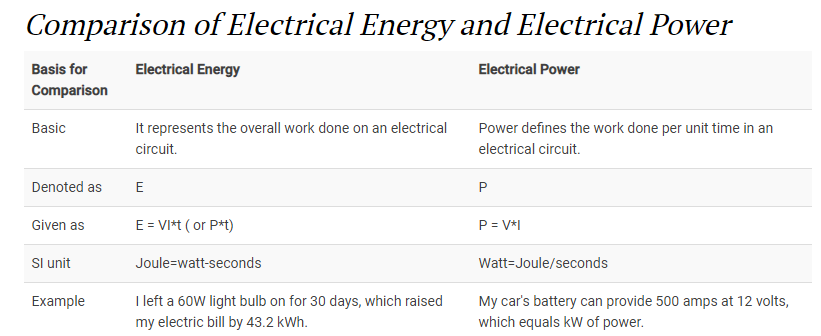Electrical energy and electrical power are the two major terms associated with the electrical and electronics systems. The fundamental difference between electrical energy and electrical power is that electrical energy represents the amount of work done that causes an electric current to flow through a circuit.
As against electrical power defines the rate at which work (basically movement of charges) is done in an electrical circuit. And the rate is specified according to unit time.
By the end of this article, you will understand the crucial differences existing between electrical energy and power. But first, see what we will discuss under this article.
Table of Contents
Comparison of Electrical Energy and Electrical Power
Basis for Comparison Electrical Energy Electrical Power Basic It represents the overall work done on an electrical circuit. Power defines the work done per unit time in an electrical circuit. Denoted as E P Given as E = VI*t ( or P*t) P = V*I SI unit Joule=watt-seconds Watt=Joule/seconds Example I left a 60W light bulb on for 30 days, which raised my electric bill by 43.2 kWh. My car's battery can provide 500 amps at 12 volts, which equals kW of power.
Definition of Electrical Energy
Electrical energy is defined as the overall work done in an electrical circuit.
We all know that energy specifies the amount of work done to move an object. And we know in an electrical circuit, electric charges show movement. Thus the work done on the electric charges in order to cause movement is known as electrical energy.
The charge particles basically hold energy, termed as potential energy and when force is applied to them then motion gets built up and the stored energy is released in the form of heat.
In the case of electric charge, the force considered to be either attractive or repulsive.
The movement of charge in an electric circuit leads to the generation of electric current. Thus we can say that the energy required to generate electric current is called electrical energy.
Suppose V is the potential difference existing across a circuit, I is the current flowing through it and Q is the charge.
Then work done will be
W = VQ
We know
I = Q/t
So we can write
Q = I t
Thus on substituting the value of Q, we get
W = VI. t
Therefore, energy is given as
E = VI.t
Energy is measured in joules or watts-sec.
Since V = IR
E= I2R. t
Or I = V/R
Thus E = V2t/R
Definition of Electrical Power
Electrical Power is defined as the rate at which work is done on an electrical system. As we have discussed recently that doing work generates energy. Thus power can be given as the rate of consumption of electrical energy.
As power deals with the rate of consumption or generation thus, is referred to as energy consumed/generated per unit time.
Now we are aware that work done is given as
W = VQ
Thus the input electrical power will be:
P = VQ/t
Since I = Q/t
Thus P = VI
We know volts is the measuring unit of voltage and ampere is the unit of current.
Thus the unit of power is Watt. But as watt denotes a small quantity then KWh i.e., a kilowatt-hour is used as a unit of power in case of higher ratings.
Since P = VI
And V = IR
Thus P = I2R
Or I = V/R
Therefore, P = V2t/R
Key Differences Between Electrical Energy and Electrical Power
- Electrical energy defines the energy generated due to the movement of charge carriers in a conductor. While electrical power specifies the rate of consumption of electrical energy by a device.
- The SI unit of electrical energy is Joules. But electrical power is measured in Watts (or KWh).
- Energy is denoted by E while P is used to denote electric power.
- The product of power and time gives the value of energy. However, power is the product of potential difference existing across 2 ends of a conductor and the current flowing through it.
Conclusion
So, this discussion concludes that both electrical energy and power are associated with the current flowing through an electrical circuit. Electrical energy appears in the form of heat and power is measured according to unit time of consumption.



3 comments
[…] Difference Between Electrical Energy and Electrical Power […]
I blog often and I really appreciate your information. The article has really peaked my interest. I will bookmark your site and keep checking for new information about once per week. I opted in for your RSS feed too.|
Power is the rate of energy transfer per unit time. Electrical power is thus the rate at which electric energy is produced or transferred or consumed/turned into some other form of energy.